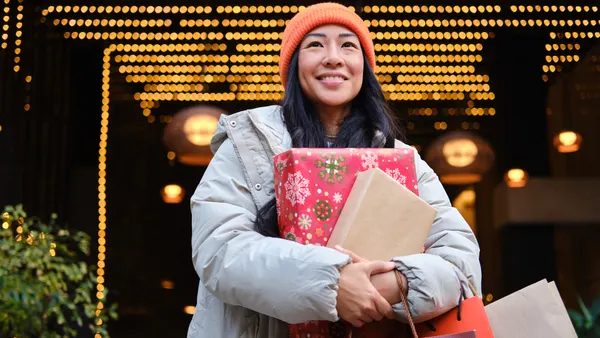It's been yet another week in the weird world of retail.
This week, Ikea's 99 cent reusable bag became the latest do-it-yourself fashion craze, Dove's body positive ad campaign went belly up and Amazon adopted a lizard.
This, and more, in this week’s Retail Therapy.
High-fashion Ikea bags
In late April, the home furnishings retailer — best-known for selling Swedish meatballs and do-it-yourself furniture — fell headfirst into the world of high fashion. Luxury handbag maker Balenciaga paid homage to Ikea’s iconic, oversized reusable “frakta” bag, most commonly used for stowing household essentials while traversing the furniture retailer’s warehouse.
The "Arena Extra-Large Shopping Tote," which is being sold online at Barney's for $2,145, sparked a fascination with consumers. The only problem is that most can’t afford the hefty price tag — and why should they when you can pick up your own frakta bag for just 99 cents a pop?
This week, Instagram exploded with photos of do-it-yourself high-fashion apparel and accessories made from frakta bags. Here’s a look at some of the most “creative” designs:
Apparently flattered by the social media craze, Ikea responded to the hype this week. “We are extremely flattered to seemingly be an inspiration for the latest catwalk designs. Our IKEA FRAKTA tote is one of our most iconic products which are already owned and loved by millions,” a spokeswoman told HuffPost UK.
The frakta frenzy didn't end there. Reebok this week also launched a “frakta fitness” workout routine using Ikea frakta bags as weights for strengthening exercises, Delmarva Now reports. From dead lifts to plastic bag push presses, Reebok trainer Andrew Connor demonstrated the versatility of the oversized sack in a series of gifs.
The moral of the story? From high-fashion to fitness, the 99-cent frakta has your back.
Neiman Marcus sneakers tear up the internet
Forget Nordstrom’s $425 mud jeans.
This week, Neiman Marcus walked out a $1,425 pair of “future destroyed” high-top sneakers. The Italian-made shoes are the creation of Belgian designer Maison Margiela, a self-described “pioneer of avant-garde fashion” who is known for conceptual pieces made out of trash bags and seat belts, among other everyday items.
These days, fashion is all about accessibility, right?
Dove’s misshapen beauty campaign
In an effort to promote body positivity, Dove recently launched a advertising campaign centered around a line of "Real Beauty Bottles" meant to "evoke the shapes, sizes, curves and edges that combine to make every woman their very own limited edition," the company said in a statement.
At a time when consumers are pushing back against the fashion world's outdated definition of beauty, the brand clearly hoped women would come together and rally around the campaign. And yet the six iterations of the bottles look nothing like actual body shapes. Instead, consumers took to Twitter to mock the brand.
.@Dove matches its new body wash bottles to your body type pic.twitter.com/zzxy21DYuH
— doctor jacobin (@vrunt) May 8, 2017
thanks Dove but I already have a body wash that matches my natural curves :) pic.twitter.com/IIkKAn0LjQ
— Tim Federle (@TimFederle) May 8, 2017
thanks dove but i already found a bottle for my shape pic.twitter.com/asuo1vci0O
— Carina Hsieh (@carinahsieh) May 8, 2017
sorry, Dove, I already found my body type pic.twitter.com/mBLzHgGzIw
— Brett _______ (@BrettRedacted) May 8, 2017
Amazon's lizard disruption
Like any good technology company in the Valley, Amazon embraces pets.
It all started with Rufus, the first Amazon dog, according to the e-commerce giant's "Meet the dogs of Amazon" webpage. Nowadays, its headquarters are filled with four-legged furry friends like Pheobe, Muffin and Talulah — to name just a few.
While Amazon is clearly a dog lover (sorry, cat people), it expanded its horizons this week and welcomed a new creature into the mix — a brown anole.
If you're not sure what an anole is, that's OK — we've got you covered. The lizard, native to Cuba and the Bahamas, was discovered by Amazon's horticulture team as it was installing two trees in The Spheres, a series of forest-like corporate domes at its Seattle campus. As a highly invasive species, the anole had to be removed from the exotic trees. But worry not — according to a post on Instagram, Living Wall Manager Ben Eiben has adopted the little guy, who is apparently doing very well.













